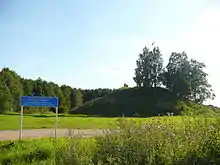kurgan
English

A kurgan
Pronunciation
- IPA(key): /kʊəˈɡɑːn/
- Rhymes: -ɑːn
Noun
kurgan (plural kurgans)
- A prehistoric burial mound once used by peoples in Siberia and Central Asia.
- 2004, Benjamin Fortson, Indo-European Language and Culture, Blackwell, published 2005, page 41:
- The kurgans and the burials they contain are consistent with the early IE burial practices outlined above, and the late Lithuanian archaeologist Marija Gimbutas proposed that the kurgan peoples were in fact early Indo-Europeans.
- 2009, Philip L. Kohl, “Chapter 6: The Maikop Singularity: The Unequal Accumulation of Wealth on the Bronze Age Eurasian Steppe?”, in Bryan K. Hanks, Katheryn M. Linduff, editors, Social Complexity in Prehistoric Eurasia: Monuments, Metals and Mobility, page 91:
- In 1897 N. I. Veselovskii excavated the very large, nearly 11 meter high Oshad kurgan or barrow in the town of Maikop in the Kuban region near the foothills of the northwestern Caucasus (the present-day capital of the Adygei Republic). […] This discovery stimulated the excavation of other large kurgans located in the same general region, some of which seemed royal-like in their dimensions and, when not robbed in antiquity, in their materials.
- 2010, David W. Anthony, The Horse, the Wheel, and Language: How Bronze-Age Riders from the Eurasian Steppes Shaped the Modern World, page 329:
- Even in the middle Volga region some kurgans have central graves containing adult females, as at Krasnosamarskoe IV. […] The appearance of adult females in one out of five kurgan graves, including central graves, suggests that gender was not the only factor that determined who was buried under a kurgan.
Synonyms
Translations
prehistoric burial mound
|
See also
- Kurgan (Курган – Kurgán, a city in Russia)
Portuguese
Turkish
Etymology
There are two principal sources considered for the word Kurgan:
- the Old Turkic [script needed] (korgan, “refuge, fortress”) and Chagatai قورغان (qurğan, “fortress, rampart, major shrine”). Both are considered as a sound shifting of Old Turkic [script needed] (korığan), from the word stem korı- ("to protect, defend") with the Old Turkic Suffix -gan forming proper names,[1] a form which has been reintroduced into Turkish during World War II as korugan (“fortification”).
- the Old Turkic word stem qur-, of which kurgan is a derivation,[2] is rooted in the reconstructed Proto-Turkic *Kur- ("to erect (a building), to establish"). This word "kurgan" is sometimes hard to distinguish from Proto-Turkic form *Kōrɨ-kan ("fence, protection").[2]
Pronunciation
- IPA(key): /kuɾˈɡɑn/
References
- “kurgan” in Nişanyan Dictionary
- Starostin, Sergei, Dybo, Anna, Mudrak, Oleg (2003) “*Kur”, in Etymological dictionary of the Altaic languages (Handbuch der Orientalistik; VIII.8), Leiden, New York, Köln: E.J. Brill. Citation:
- “EWT 302, EDT 643, ЭСТЯ 6, 156-157. There is also a derivative *Kur-gan (see e.g. TMN 3, 542-543), which is sometimes hard to distinguish from *Kōrɨ-kan (see *Kōrɨ-).”
This article is issued from Wiktionary. The text is licensed under Creative Commons - Attribution - Sharealike. Additional terms may apply for the media files.